Free trade agreements (FTAs) are indeed crucial for fostering economic growth and prosperity on both national and global scales. These agreements facilitate the exchange of goods, services, and investments between countries by reducing barriers such as tariffs, quotas, and regulatory restrictions. Here are several reasons why FTAs are essential for economic growth:
FTAs provide businesses with access to larger markets beyond their borders, enabling them to sell their products and services to a broader customer base. This expanded market access can lead to increased sales, production, and profits, stimulating economic growth.
By promoting specialization and the efficient allocation of resources, FTAs encourage countries to focus on producing goods and services in which they have a comparative advantage. This specialization enhances productivity and efficiency, driving economic growth by optimizing resource utilization.
FTAs often include provisions that protect and promote foreign investment. By providing a predictable and stable investment environment, these agreements attract foreign capital, technology, and expertise, which can spur innovation, upgrade infrastructure, and create jobs, all contributing to economic growth.
FTAs encourage domestic industries to become more competitive globally by exposing them to international competition. This pressure to innovate, improve quality, and reduce costs can enhance the competitiveness of domestic firms, ultimately leading to higher productivity and economic growth.
FTAs facilitate the integration of supply chains across borders by reducing trade barriers and harmonizing regulations. This integration allows businesses to access inputs and intermediate goods more easily and cost-effectively, fostering efficiency and innovation throughout the production process.
FTAs often result in lower prices for consumers due to increased competition and access to a wider variety of products. Lower prices can enhance consumers’ purchasing power, leading to increased consumption and economic growth.
FTAs can also have broader diplomatic and geopolitical benefits by fostering closer ties between countries and promoting peace and stability through economic interdependence.
In conclusion, free trade agreements play a vital role in promoting economic growth by expanding market access, enhancing efficiency and productivity, stimulating investment, fostering competitiveness, integrating supply chains, benefiting consumers, and promoting diplomatic relations. Therefore, countries often prioritize negotiating and implementing FTAs as part of their economic strategies.
For more information visit at https://happenrecently.com/zepto/?amp=1



